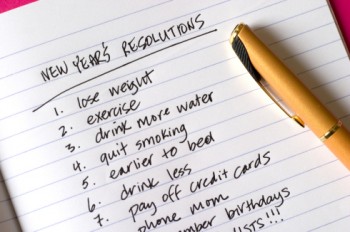New Year's Resolution: Quit Drinking, Smoking, or Drugging
Making a New Year's resolution to quit an addiction is about more than stopping the act of smoking, drinking, or using drugs. We also need to develop a lifestyle and environment around the change we want to make. When your life is shaped around addiction recovery instead of alcohol, tobacco, or drugs, it's much harder to relapse.
You Don't Need A New Year's Resolution to Quit Addiction

Every year, millions of people around the world make New Year's resolutions like this one from the movie, Bridget Jones's Diary which sums up the practice perfectly:
"New Year's resolution-- drink less. Oh, and quit smoking. Mmm. Ha ha. And keep New Year's resolutions." ~ Bridget Jones's Diary
We set a resolution or two, don't take them seriously, and expect to fail.
Some people blame the concept and say our annual failings only serve as proof that New Year's resolutions don't work. In reality, the reasons we fail have less to do with making resolutions and more to do with the fact that we lack the lasting motivation that will sustain us through thick and thin.
4 Essential Steps to Quit Addiction
When you're ready to quit drinking, stop smoking, or get off drugs, it doesn't matter if you start on January 1st or July 14th. If you're ready now, here are four essential steps to making that a lasting change in the New Year.
Establish a Support Network in Drinking, Smoking, Drugging Recovery
True friends are the people who show up when you have nothing to give them but time. Figure out who those people are and tell them what addiction you're trying to quit. If there's no one, go see a doctor. If you can't afford a doctor, go to a self-help recovery meeting for your addiction. If you don't know what free programs are available, see this post about comparing three different types of self-help addiction recovery programs.
You need someone to have your back, no matter what happens during your recovery process, or how many times you have to start again.
Note: This person is not your therapist. They are not supposed to fix you, advise you, or change your life. The idea is that you tell someone you know and trust why you want to quit your addiction. They are your personal cheerleader and an unconditionally supportive friend.
Focus on Small Triumphs Against Addiction
Whatever method or tools you use to overcome your cravings, recognize that each day that you don't drink, smoke, or use is a small miracle. Acknowledge the moments where you felt triggered, but were able to ride out the craving by chewing a piece of gum or making a phone call to someone in your support network.
Almost every single person I have met in recovery has achieved long-term sobriety by simply stringing together several small triumphs. Remember the phrase,
"When eating an elephant take one bite at a time." ~ Creighton Abrams
Resolve To Be Patient With Yourself
You aren't going to wake up perfect tomorrow because you made a good choice today. We all spent the first several years of our lives learning how to speak, read, and write. Quitting drinking, smoking, and drugging is a learning process like any other. It takes takes time and practice to rid ourselves of unhealthy and addictive behaviors. Then it takes time develop new coping skills and to adjust to a different lifestyle.
Addicts are impulsive people by nature. Develop patience by practicing impulse control.
Remember What Inspired This New Year's Resolution
Before you take a drink, take a drag off a cigarette, or pick up a drug to use, remind yourself why you quit in the first place. Chances are good that you had an excellent reason to quit. But as time passes, it becomes easier it is to forget the reasons you quit your addiction.
Also remember, there is more at risk here than just a flighty New Year's resolution.
I must remember that as an alcoholic, my body has an uncontrollable physiological response to alcohol. For me, that reaction is so severe that it puts my life, and the lives of people around me, in jeopardy.
I need to be reminded of the pain, anxiety, and loneliness I felt when I first got sober. Desperation was my motivation to get sober, and the memory is my inspiration to stick with it -- no matter what.
You can find Becky on Facebook, Twitter, Google+ and her website.
APA Reference
Doyle, B.
(2015, January 1). New Year's Resolution: Quit Drinking, Smoking, or Drugging, HealthyPlace. Retrieved
on 2026, March 4 from https://www.healthyplace.com/blogs/debunkingaddiction/2015/01/new-years-resolution-quit-drinking-smoking-or-drugging
Author: Becky Doyle
Thanks for sharing this advice great post. I agree that being open about your family history is a great way to determine any sort of medical abnormalities.
What has been the success rate with the process mentioned above? I really don't want to set myself up for another failure.
N
Hi Nathaniel! This is a summary of what I learned through several different resources, and the most common advice given to me by other men and women in recovery. It is not an established "program of recovery. I recommend you take a look at my post titled "What are Addiction Recovery Programs and Do They Work?" http://www.healthyplace.com/blogs/debunkingaddiction/2014/12/what-are-recovery-programs-a…